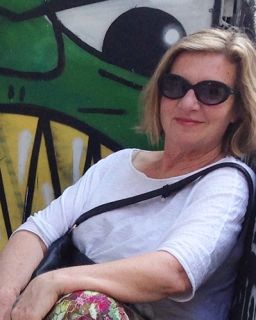What an exciting time to be able to be at the School of Art and Design.
“Like many things in life, the path just opened up and I fell into it,” says Anni Wawrzynczak.
Anni, who will be graduating with her PhD in mid-July, has gone down many interesting paths prior to the one which led her to ANU, where at age 40 she did her undergraduate degree.
She had been accepted to do Law here after she finished school. But instead of following the normal life trajectory, she became a jazz singer.
“I wanted to sing,” she affirms.
“And I wanted to do a bunch of other things that didn't include going to university. So all those years ago I could have come to Canberra, but didn't.”
Jazz singing took her all over Australia and Asia. She worked on cruise ships and did residencies in Japan, Taiwan, China. After that, she lived in Hobart for ten years and ran a small production company with some friends.
Among the television programs they made was a documentary about the first disabled crew to sail the Sydney to Hobart yacht race. It did well, screening in Australia and on PBS in the US.
“It was a big life in Hobart,” Anni says.
She came to Canberra in 2000 with her husband, Jan, who had landed the role of General Manager at Canberra Youth Theatre.
“Jan said to me, ‘You haven’t been to university. We’re in Canberra – the national university is here. Go full time. Get a degree. Let’s be poor. ’”
That’s how Anni came to do her Bachelor of Arts at the ANU, majoring in Art History and Film.
Anni wasn’t the only member of the family who was studying at the time.
“If you have a child at school, and you yourself are at university, suddenly the place opens up,” Anni says.
“That's how I started falling in love with Canberra.”
She also loved studying at the School of Art and Design. So much so that she went on to do her Honours and then PhD.
“I’m so pleased that art history and art theory and the practice of the visual arts and digital art history and design now are all under that one school,” Anni says.
“I think the culture of the school is extremely positive and healthy.
“What an exciting time to be able to be at the School of Art and Design.”
In March 2008, Anni began her PhD. In June, everything changed. Her husband was in an accident and died two months later.
She had been researching contemporary political Indigenous art. But after her husband’s death, she couldn't return to that field.
“There are too many terrible stories within my earlier field and I felt like I couldn't manage the horror of those as well as my own forward journey,” Anni says.
Anni resumed her PhD in 2010. The topic she settled on was a history of the development of arts and culture in Canberra with the history of Bitumen River Gallery/Canberra Contemporary Art Space as her case study.
“It's about the triumph of local arts over the national capital cultural imperative,” Anni explains.
She defines the national capital cultural imperative as being to show Australian culture to the rest of Australia and the world. Local arts, on the other hand, is about Canberra: who we are as Canberrans rather than as national capital citizens.
Accordingly, Anni believes the major influence on Canberra arts and culture has been the carving out of our local space within the national space.
“As humans, anywhere we gather we need to find our own local, cultural voice,” she says.
“So I think the major influence was on that drive to find the power of the local within this pre-eminent, overriding imperative to the national.”
Her involvement in the local scene is not just academic. Anni works as a stage manager and facilitator for productions across dance, theatre, music and the visual arts. She’s also a member of the Canberra Arts Action Group, which advocates for more funding.
“I don't actually get how people don't understand how important the arts are,” Anni says.
“From prisons, schools, old people, young people... people who are intellectually and physically different – across every strata of society, in every community, the arts enliven and lift and encourage and give people a voice and hope for the future.”
Her PhD thesis serves as an argument for why the government should make a greater investment in the arts, and one of the things she’ll be doing post-graduation is to get the knowledge she has accumulated out into the public as widely as possible.
“Some people think history isn't very important, but I believe, especially in Canberra, it's critical.
“Who are we and where did we come from? How did we get to here?” she says.
“My great hope is that this history that I've written can help our local arts milieu continue to grow.”

Degree
Bachelor of Arts (Art History and Film), PhD (Art History)
